DARAPANAN, Sultan Kudarat, Maguindanao del Norte (MindaNews / 30 March 2024) – The Comprehensive Agreement on the Bangsamoro (CAB) marked its 10th anniversary on Wednesday, March 27 with peace stakeholders gathering here to celebrate the first decade of implementing the peace agreement.
That it was not a joint celebration has baffled many. The celebration was hosted by the Moro Islamic Liberation Front (MILF) in its base, Camp Abubakar. The MILF and Philippine government (GPH) are the parties that forged the CAB, the peace agreement that ended nearly 50 years of armed conflict, paving the way for the creation of the Bangsamoro Autonomous Region in Muslim Mindanao (BARMM). and the hailing of the Bangsamoro peace process as a model for other countries to learn lessons from.
The CAB contains12 agreements, including the July 1997 general ceasefire agreement and the 2012 Framework Agreement on the Bangsamoro (FAB) and its annexes on power-sharing, wealth-sharing, normalization and transitional arrangements and modalities, and the addendum on Bangsamoro waters.
Although the agreement is 10 years old, it was only in July 2018 or four years and a new administration later, that the CAB’s enabling law, the Organic Act for the BARMM, was passed. The law was ratified in a plebiscite in January 2019 and in February, then President Rodrigo Duterte appointed 80 members of the MILF-led Bangsamoro Transition Authority (BTA), the body tasked to govern the BARMM during the transition period until June 30, 2022.
On March 29, 2019, Duterte flew to Cotabato City to grace the inaugural session of the BTA Parliament whose 41 members were nominated by the MILF and 39 by the GPH.
Before Duterte stepped down as President on June 30, 2022, Congress passed a law extending the Bangsamoro transition period until June 30, 2025, the same day elected officials of the BARMM take over from the appointed.
President Ferdinand Marcos Jr. appointed 80 members of the BTA and declared at the oath-taking in Malacanang in August 2022 that in 2025, “we no longer will have any extension to the authority, and we will conduct elections.” May 2025 will be the first time voters in the BARMM will elect their 80-member Parliament.
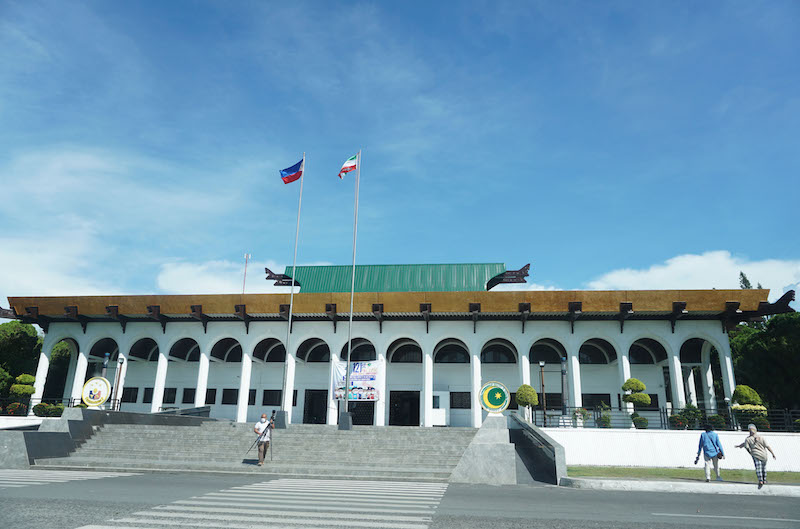
The BARMM is the only region in the country whose system of governance is parliamentary.
No formal invitations were sent out by the MILF to the Members of Parliament. A message via chat group was sent to the MPs late Tuesday afternoon, March 26. As it is Ramadan, the celebration was scheduled at 2 p.m. on March 27, ending with Iftar (breaking of the fast). Only a few MPs and Cabinet members were present.
The BTA has passed four priority codes – Administrative, Education, Election and Local Governance, but has yet to pass the Revenue Code and the Indigenous Peoples Code.
The Philippine government was represented in the celebration by Secretary Carlito Galvez, Presidential Adviser on Peace, Reconciliation and Unity, officials in the Bangsamoro peace mechanisms and from the 6th Infantry Division.
Former members of the peace panels and representatives of civil society were also present.
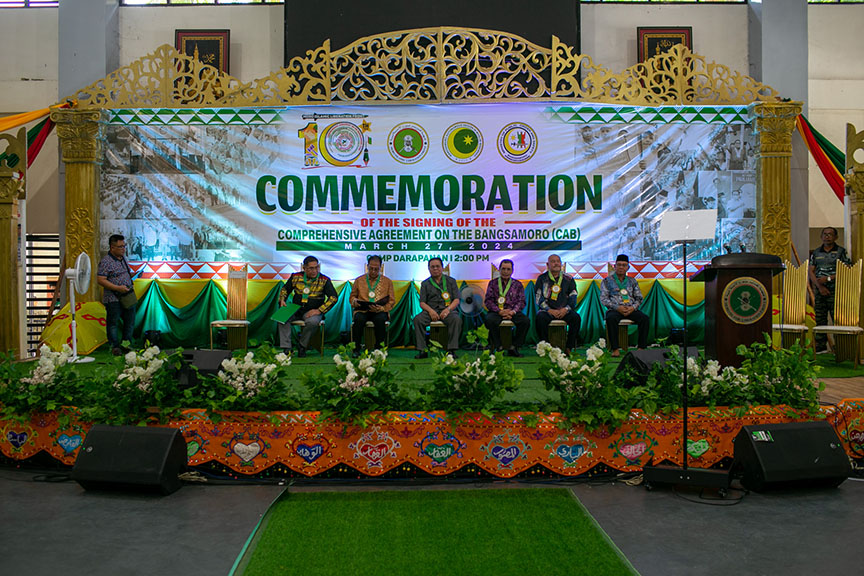
Prof. Miriam Coronel-Ferrer, the government peace panel chair who signed the CAB in 2014, attended the celebration of what she considers “unique” peace process because “we have sustained the peace for 10 years.”
“The fact that it’s still here,” she said, adding that most of the peace processes worldwide don’t last.
“Shared victory”
“We celebrate today the shared victory of the Bangsamoro and the Filipino people,” MILF chair Al Haj Murad Ebrahim said on March 27, 2014, at the signing of the CAB at the Kalayaan Gardens in Malacnang.
The CAB, he said, “finally brings with it the restoration of the identity, powers and resources of the Bangsamoro. These three things which have been ours since time immemorial, unjustly taken through colonization and occupation, are now returned to us.”
The CAB is the “crowning glory of our struggle… to find the final answer to the Bangsamoro Question,” a negotiated political agreement “that not only promises but guarantees mutual recognition, respect and restoration of the legitimate rights of the people in the Bangsamoro,” he said.
Then President Benigno Simeon Aquino III called on the Filipino people to “widen the avenues for trust and positive engagement,” to “cast aside past prejudices, and contribute to the atmosphere of optimism that has, for the first time in a long while, become prevalent in Muslim Mindanao.”
“It should be the paramount concern of all people of goodwill to do their part: Let us exchange our bullets for ripening fruit, our cynicism for hope, our histories of sorrow for a future of harmony, peace, and prosperity,” he said.
The FAB in 2012 and CAB in 2014 were signed under the Aquino administration.
Ten years later
Ten years later, on March 27, 2024, inside a newly-constructed gymnasium in the MILF’s base, Camp Darapanan, MILF chair Murad said the establishment of the BARMM in 2019 “truly paved the way for good governance and resulted in a stronger, better-resourced autonomous region, suited to the way of life of the Bangsamoro.”
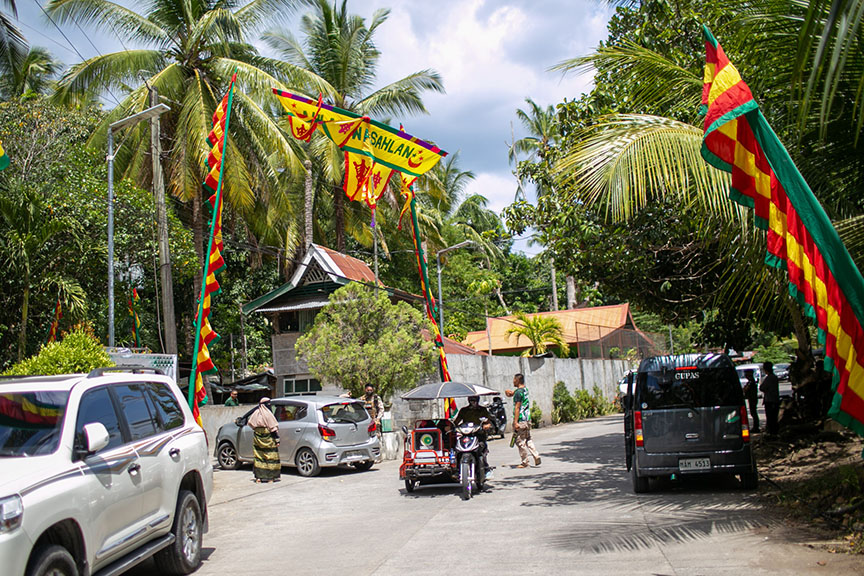
“We speak the language of ‘autonomy’ as we continue to push for greater support for the Bangsamoro at the local and national levels,” he said. Since his appointment in 2019 as interim Bangsamoro Chief Minister, Murad has been using hs real name, Ahod Balawag Ebrahim but a copy of his March 27, 2024 message identified the author as Al Haj Murad Ebrahim, his nom de guerre in yhr MILF.
The MILF chair said the BARMM has “enormously changed the landscape of governance, by exemplifying the virtues of moral governance in the region.” They have put in place, he said, a BARMM that gives “due regard to individual and collective rights; a government that is democratic, and representative of the diversities we embrace in the territory.”
Under the MILF’s governance of the BARMM, he said, poverty rate in the region has declined, investments increased, employment opportunities became available, and economic activities opened, “uplifting the lives of the Bangsamoro people.”
Secretary Carlito Galvez, Presidential Adviser on Peace, Reconciliation and Unity, said the government and MILF embarked on a “historic journey that has brought us closer to our shared goal of fostering greater peace, development and stability in the region.” Galvez, who served as Chief of Staff of the Armed Forces of the Philippines before he was named Peace adviser, once chaired the Coordinating Committee for the Cessation of Hostilities (CCCH) for the government peace panel in the talks with the MILF.
Galvez said the CAB “has dramatically transformed the security, socio-economic and socio-political landscape of the Bangsamoro region and the rest of Mindanao” and has paved the way for a “future that is filled with aspiration, hope and the promise of a better life for the Bangsamoro people and all Filipinos.”
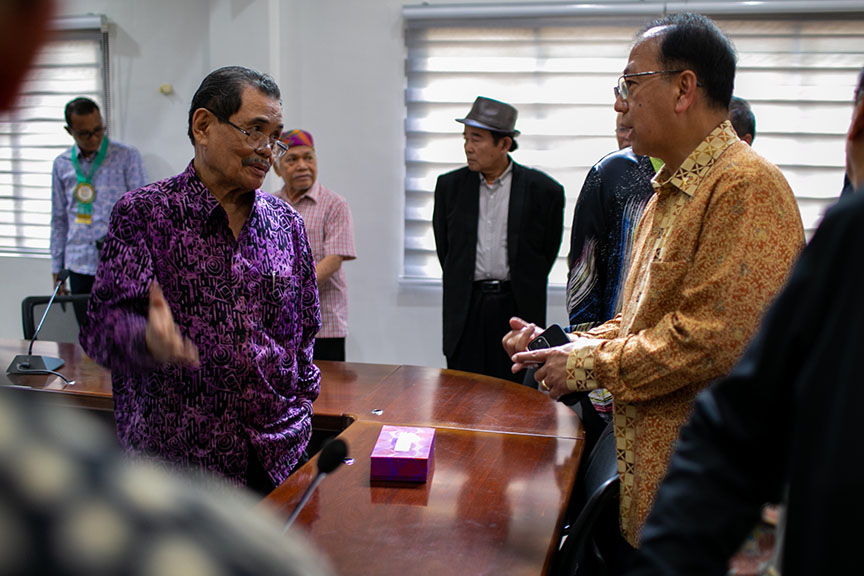
Mohagher Iqbal, peace panel chair who signed the FAB and the CAB for the MILF, spoke about over 50 armed conflicts raging across the world these days and how we are “witnessing a harrowing genocidal onslaught against innocent Palestinian men, women, and children in Gaza, while the international community stands frozen in paralysis, failing tragically to intervene and halt this catastrophic injustice.”
This is why it is “imperative to cherish the Bangsamoro peace agreement and to guard the peace, as if our very lives and the safety of our children depend on it, and as if the future of our entire nation hinges precariously upon its success,” he said.
Unique
Ferrer narrated how she is often asked “paano nyo ba ito ginawa” (how did you do this?). She said several areas in the world have been learning from the Bangsamoro peace process — from the negotiation to the implementation phases — as we have learned from other areas before.
She cited other contributory factors that make the Bangsamoro peace process “unique.”
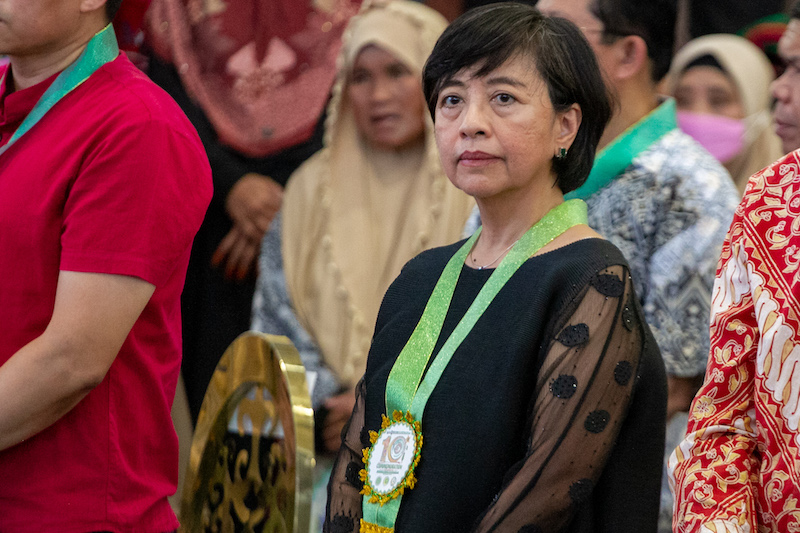
“We have a lot of good mechanisms,” she said. She was referring to the Coordinating Committee on Cessation of Hostilities, the Ad Hoc Joint Action Group, International Monitoring Team, International Contact Group, Third Party Monitoring Team, International Decommissioning Body, InterGovernmental Relations Body, Joint Peace and Security Teams, among others.
Another factor, she said, is the presence of women in the peace process. In other parts of the world, only men sit at the negotiating tables, she said.
She noted how the experience of the Bantay Ceasefire, a community-based ceasefire monitoring system then led by lawyer Mary Ann Arnado, now an MP.
In her welcome remarks 10 years ago at the CAB signing, Teresita Quintos-Deles, then Presidential Adviser on the Peace Process (now of Principles for Peace), said: “A new dawn has come, the dawn for books, not bullets; for paintbrushes, not knives; for whole communities, not evacuation centers; and for rewarding toil, not endless strife.”
She told MindaNews on Saturday that the CAB has held on for 10 years “through some of the most difficult years for the country and the planet.”
She said it is not yet sunrise “but I think more rays of light in the sky than when the CAB was signed.”
“Baka malayo pa ang full noontime sun. .. Baka may mga kulog at kulimlim bago umabot doon but, yes, based on the hopes I tried to express in my welcome remakrs 10 years ago, the dawn has come and continues to hold. Insha Allah, the sun will rise,” Deles said.
But she added that the peace process should be monitored, accompanied and should be on the national agenda to gain more support.
Civil Society
In a statement, the Initiatives for International Dialogue (IID) said March 27 is not just the 10thanniversary of the CAB but a day to “further reflect on what else needs to be done to fulfill the political promise of the peace pact.”
The CAB, it said, is a product not only of political negotiations between the government and the Bangsamoro “but also of the peacebuilding communities’ decades of peacemaking.”
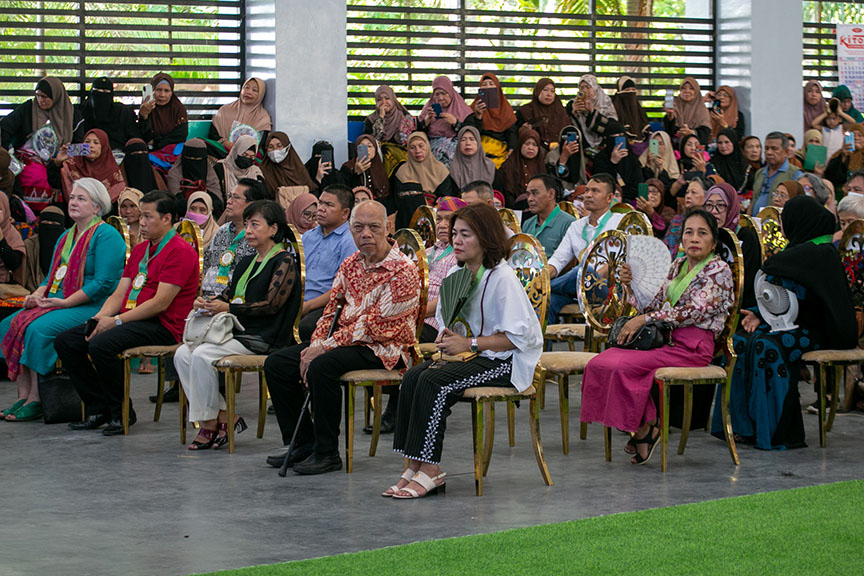
“We are here today, stronger and with a firmer resolve to persevere and defend the political vision and intent of what we claim as ‘Our CAB.’”
It listed down what been achieved and what its challenges are, including the fact that the BARMM has yet to implement the provision on Transitional Justice-Dealing with the Past (TJ-DWP), a critical strategy that could address the legacies of serious human rights violations, marginalization, land dispossession, and historical injustices committed against the Bangsamoro.
The IID also cited the state of thousands of Internally Displaced Peoples (IDP) in Marawi, most of whom have yet to return to the homes they left in 2017 when the Islamic State-inspired Maute Group and government forces turned their villages into a battlefield and then President Duterte declared martial law.
The eight-year suffering of the displaced residents of Marawi “is a stark example of how challenging TJ has yet to be attained in the Bangsamoro,” it said, adding that the quest for transitional justice is what underpins the long struggle for self-determination of the Bangsamoro people.
In a Joint Statement, the Centre for Humanitarian Dialogue and Conciliation Resources, both members of the ICG, said a decade since the CAB signing, “the people of Mindanao have benefitted from greater peace and security, testifying to the benefits of this landmark peace agreement.”
“And while there is much that still needs to be done, the achievement stands out all the more in today’s world where peace and the formal means of achieving it are so rarely in evidence,” the CHD and CR said.
The Principles for Peace (P4P) in a statement said the CAB has seen significant milestones but “more needs to be done to fully realize the peace agreement’s aspirations and ensure sustained stability in the region.”
It noted that the decommissioning of MILF forces, transformation of MILF camps, effective intergovernmental relations, and progress in transitional justice remain critical areas needing attention.
Member of Parliament Ras Mitmug described the signing of the CAB 10 years ago as a “testament that nothing is impossible when we all work together to attain peace and it is through the CAB and its subsequent passage into law of the Bangsamoro Organic Law that we wear able to achieve a self-rule that we have today.”
Sustaining the gains of peace is a highly collaborative task but the foundation has already been laid, he said.
Mitmug called on the Bangsamoro youth to “always remember this and be part of the collective effort for a peaceful and prosperous Bangsamoro in the years to come.”
Beyond June 30, 2025
The Third Party Monitoring Team (TPMT) which was established in 2013 to monitor the implementation of the peace agreement said a lot has been achieved since the CAB was signed, including laying out the foundations for “genuine and meaningful self-governance.”
It also noted that progress in the normalization track, which ensures human security in the BARMM, has been slower as there are many tasks that need to be accomplished aside from decommissioning of combatants and weapons: camps transformation, policing, amnesty, redeployment of the AFP, disbanding of private armed groups and transitional justice.
“There is a perceptible new drive by the reconstituted Peace Implementing Panels to fast-track implementation of the normalization track” but it has also become clear, it added, that “some elements of the peace process may not be complete by the end of this transition phase in June next year.”
“We as TPMT believe that it is essential for the Parties to uphold the legitimacy and credibility of the CAB. This can be ensured by avoiding unilateralism in implementation, by securing the inclusiveness of the peace process and by nurturing the sense of ownership by stakeholders both in the BARMM and across the Philippines,” it said.
The TPMT also stressed that the CAB “has opened the path to lasting peace for the Bangsamoro” and represents a “historic opportunity not to be missed.”
According to the FAB in 2012, the government and MILF are to sign an Exit Agreement when all the provisions of the peace agreement shall have been implemented. (Carolyn O. Arguillas / MindaNews)



